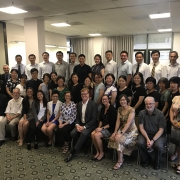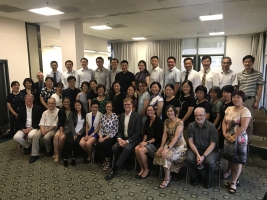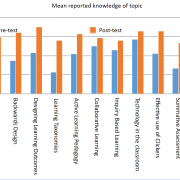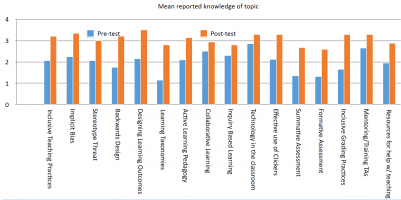| Atmospheric & Oceanic Sciences |
Increasing Undergraduate Comprehension of Atmospheric and Oceanic Fluids via Rotating Tank Experiments |
Andrew Stewart & Gang Chen |
| Atmospheric & Oceanic Sciences |
Data Analysis for Climate Science |
Neil Berg |
| Chemistry & Biochemistry |
Artificially Intelligent Assessment and Learning System for Chem 17 “Preparation for General Chemistry” |
Zhao Li & Yung-Ya Lin |
| Chemistry & Biochemistry |
Evaluating the impact of learning assistants in an introductory organic chemistry sequence for life science majors |
Rachel Prado & Roshini Ramachandran |
| Chemistry & Biochemistry |
Assessment of Teaching Practices in Chemistry 153L: A laboratory course on Introduction to Protein Science – What are reasons for the performance gap in the course? Which interventions will help to reduce this gap? |
Anne Hong-Hermesdorf |
| Chemistry & Biochemistry |
Machine Learning for every chemistry professional |
Anastassia Alexandrova |
| Chemistry & Biochemistry |
Creating valid, reliable pre- and post-assessment tools to assess students’ abilities to retain, transfer, and apply acid-base chemistry concepts in general chemistry, organic chemistry, and biochemistry |
Jennifer Casey, Heather Tienson-Tseng, Al Courey |
| Chemistry & Biochemistry |
Utilizing application-based science education videos in an undergraduate chemistry laboratory course for life science majors |
Roshini Ramachandran & Jennifer Casey |
| Communication Studies |
TV News Archive User Interface Improvement |
Francis Steen & Tim Groeling |
| Comparative Literature |
Classroom Coding for the Humanities |
David MacFadyen |
| Design |
p5.js: Developing a Tool for Making Art and Design with Code |
Lauren McCarthy |
| Earth, Planetary, and Space Sciences |
Geophysics Hawaii Volcano Field Trip |
Paul Davis |
| Ecology & Evolutionary Biology |
Transforming Introduction to Ecology and Behavior into a more active classroom |
Daniel Blumstein |
| Ecology & Evolutionary Biology |
Using Modern Classroom Technology in a Large, Upper-Division Class “Evolutionary Medicine” |
Pamela Yeh, Benison Pang, Jessica Gregg |
| Ecology & Evolutionary Biology |
Sustainable Native Gardens |
Alison Lipman & Leryn Gorlitsky |
| French & Francophone Studies |
Implementing Integrated Performance Assessments (IPAs) in the French Language Program at UCLA |
Kimberly Jansma & Laurence Denie |
| Integrative Biology & Physiology |
Achieving intimate research experience at scale |
Roy Wollman |
| Life Sciences Core Education |
A Pilot: Mobile All-in-one Virtual Reality computer station used in Laboratory Course Life Sciences LS23L |
Gaston Pfluegl |
| Life Sciences Core Education |
Enhancing Motivational Predictors of Student Success Across the Introductory Life Sciences Curriculum |
Jeffrey Maloy & Erin Sanders O’Leary |
| Musicology |
Creating Musical Community (Ethnomusicology/Music/Musicology M103) |
Nina Eidsheim & Mark Kligman |
| Musicology |
Videotape course: “The Reel Beatles” |
David Leaf |
| Physics & Astronomy |
Data-driven, Systematic, and Sustainable Transformation of Physics for Life Scientists |
Ian McLean, Katsushi Arisaka, Joshua Samani, George Trammell, Elizabeth Mills, Shanna Shaked |
| Physics & Astronomy |
Proposal to enhance infrastructure of 180E physics undergraduate lab |
Walter Gekelman |
| Psychology |
Developing a Tool to Assess the Learning Gains of the Neuroscience Curriculum |
William Grisham |
| World Arts & Cultures/Dance |
Legislative Theater for Racial Justice |
Robert Gordon, Bryonn Bain, David Gere |





